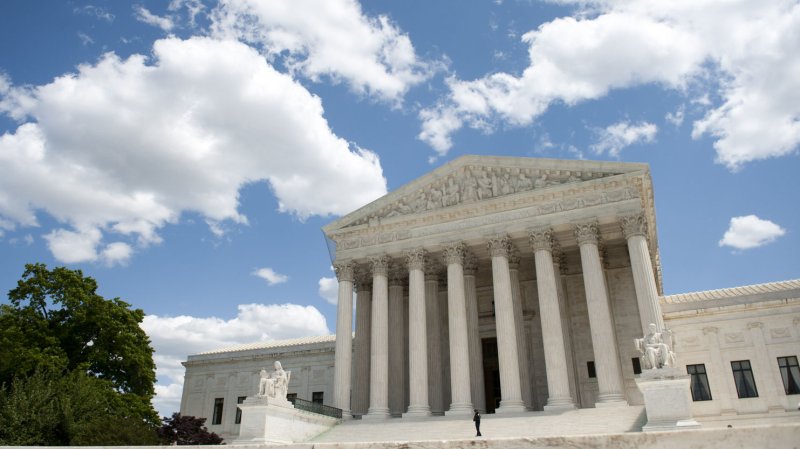The Supreme Court in Washington, D.C. UPI File Photo/Kevin Dietsch |
License Photo
WASHINGTON, June 18 (UPI) -- The U.S. Supreme Court ruled 8-1 Monday that a neighbor has the right to sue to keep a Michigan Indian band from acquiring land to hunt and to build a casino.
The Indian Reorganization Act authorizes the secretary of the interior to acquire property "for the purpose of providing land to Indians."
The Match-E-Be-Nash-She-Wish Band of Pottawatomi Indians in rural Michigan, a tribe federally recognized in 1999, asked the secretary to act on its behalf and take into trust the Bradley Property, which the band intended to use "for gaming purposes."
The secretary took title to the property in 2009, but neighbor David Patchak filed suit under the Administrative Procedure Act, saying the law did not authorize the secretary to acquire the property because the band was not a federally recognized tribe when the Indian Reorganization Act was enacted in 1934.
Patchak alleged a variety of possible economic, environmental and aesthetic damages because of band's proposed use of the property to operate a casino.
A federal judge did not rule on the merits of Patchak's suit, but said he lacked standing to challenge the secretary's acquisition of the property. A federal appeals court in Washington reversed and also rejected the secretary's and the band's alternative argument that sovereign immunity barred the suit.
The Supreme Court, in a majority opinion written by Justice Elena Kagan, said the federal law "has far more to do with land use than the government and band acknowledge. [The law] is the capstone of the IRA's land provisions, and functions as a primary mechanism to foster Indian tribes' economic development. The secretary thus takes title to properties with an eye toward how tribes will use those lands to support such development. The department's regulations make this statutory concern with land use clear, requiring the secretary to acquire land with its eventual use in mind, after assessing potential conflicts that use might create. And because [the law] encompasses land's use, neighbors to the use [like Patchak] are reasonable -- indeed, predictable -- challengers of the secretary's decisions: Their interests, whether economic, environmental, or aesthetic, come within [the law's] regulatory ambit."
Justice Sonia Sotomayor filed a dissent.















